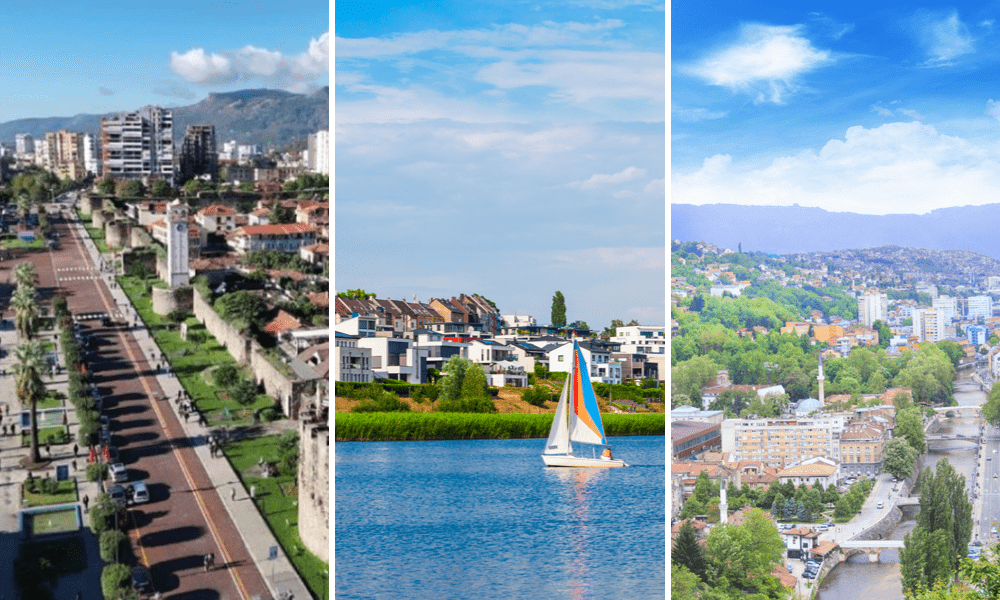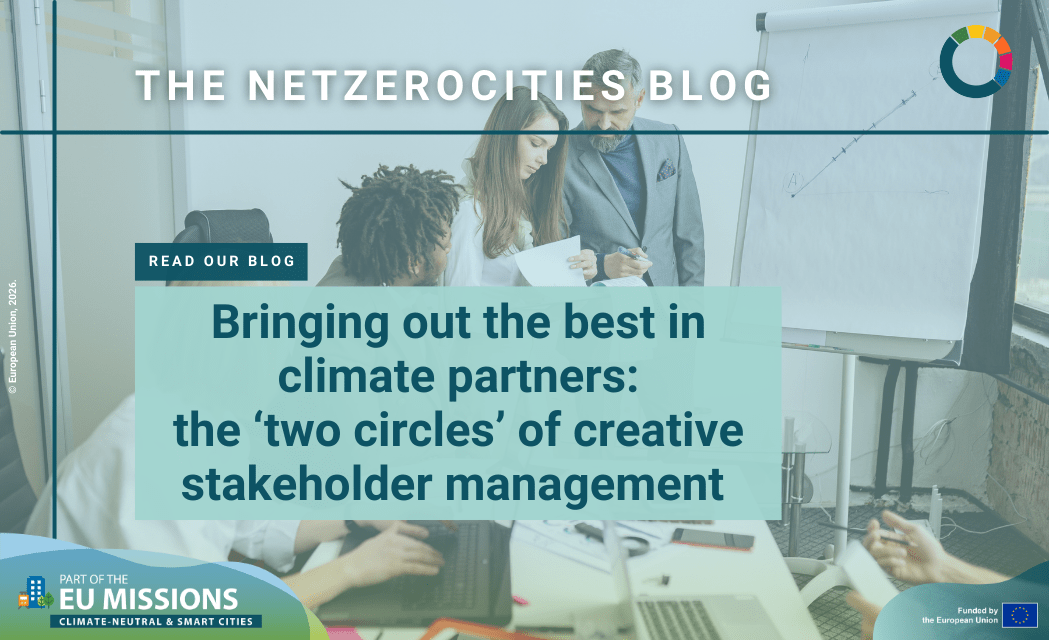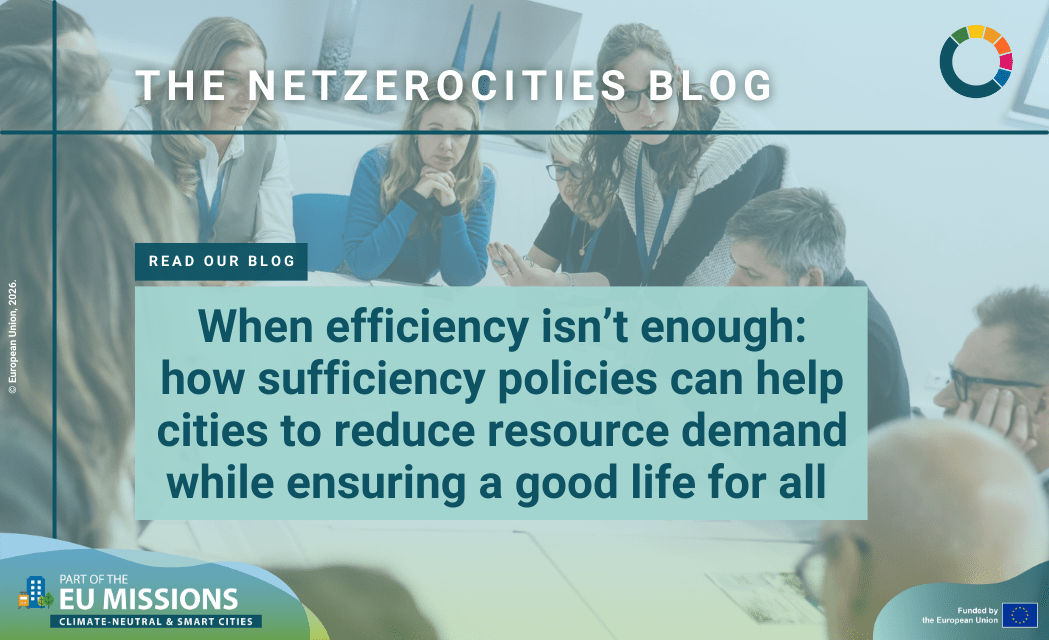As Europe’s cities accelerate their climate ambitions, the need for structured, practical collaboration is becoming increasingly essential. In response, NetZeroCities launched the first Online Discussion Groups in autumn 2024, a peer-learning initiative open to all cities designed to help them move from climate planning to delivery.
The initiative was specifically designed for cities that are not part of the 112 EU Mission Cities, but that share the same bold climate ambition and mission-driven mindset. These Mission-minded cities joined the Online Discussion groups to accelerate their transitions by learning from those already further along. Over the course of six months, 75 cities from 24 countries came together to explore what climate-neutral transformation looks like in practice, totalling over 180 individual participants.
They heard directly from Mission Cities about the decisions, partnerships and pivots behind their Climate City Contracts, and then took those lessons home, reflecting on what might work in their contexts. Valongo, for instance, was inspired by Leuven’s citizen-led approach to redesigning public spaces and temporary street transformations, which they saw as directly applicable to their planning process. As they reflected,
“The projects of Leuven have huge relevance in terms of learning for Valongo Municipality, especially in the following aspects: sharing strategies for involving citizens in decision-making processes; technical solutions for experimenting [with] temporary changes in urban context. These will help in implementing Valongo’s Climate Action Plan.”
Gabrovo, meanwhile, began exploring how Lahti’s restoration of urban peatlands and green infrastructure could be adapted to enhance its local public spaces and citizen wellbeing. In both cases, the goal wasn’t just replication, but adaptation using what works elsewhere to shape climate action that fits local needs.
The result was a learning experience rooted in the everyday reality of delivering heat networks, rethinking streets, and designing climate-neutral buildings, all with community engagement, financing gaps and governance challenges in mind.
A Learning Journey Built for Replication
The Online Discussion Groups followed a four-phase structure that guided cities from inspiration to action. The programme began by orienting participants to the EU Cities Mission and tools developed by NetZeroCities to support Mission Cities’ climate neutrality journey, offering a shared foundation. Cities then joined as many thematic sessions as they found relevant, focused on five sectors critical to emissions reduction: energy, mobility, the built environment, nature-based solutions and the circular economy.
In each session, between one to three different Mission Cities, presented specific actions outlined in their Climate City Contracts. These weren’t theoretical best practices; they were live case studies highlighting the key drivers and lessons learned to inspire their peer Mission-minded cities. Cities like Mannheim in Germany explained how they are transforming their district heating systems with citizen buy-in and detailed, street-level planning. In Guimarães, city leaders showed how they’re adapting energy retrofits for protected heritage buildings. Leuven and Lahti offered insights into how nature can be re-integrated into urban landscapes, from restoring peatlands to replacing asphalt with green space. Other cities, such as Valencia and Aachen, unpacked how new energy communities and circular construction markets are reshaping infrastructure and participation.
After these peer exchanges, the programme moved into a deeper phase of reflection and support. Cities collaborated with expert facilitators to understand how these practices could be applied in their specific contexts, identifying barriers, mapping enabling factors, and developing what became known as a “Reflection Roadmap.” These personalised plans helped cities distil their learnings and clarify next steps for implementation. For many, this marked a transition from learning to doing.
A Platform for Impact
What made the Online Discussion Groups stand out wasn’t just the quality of information, but the quality of interaction. The sessions were structured to promote candid exchange about what’s working, what’s difficult, and what others can take away. Rather than focusing only on successes, Mission Cities shared how they overcame hurdles and reconfigured plans to make climate action stick.
That honesty mattered. Cities across the cohort reported that seeing how others approached similar challenges helped them build confidence and unlock new ideas. The technical support phase of the programme also helped to move this inspiration into strategy. Through expert-led sessions, cities explored systems thinking, stakeholder engagement, and portfolio design to adapt climate actions to their own governance, regulatory, and spatial contexts.
Perhaps most importantly, the programme helped cities build relationships. Some of these connections will continue further, through Group Study Visits in 2025, where nine selected participants will visit Mission Cities such as Mannheim, Guimarães, and Bucharest for in-depth, in-person exchanges.
Why Cities Should Join Cohort 2
The success of the first cohort proved the value of structured, facilitated peer learning. Cities consistently shared that what they gained was more than knowledge; they gained a pathway to action. The programme provided them with time, focus, and access to free expertise that helped translate their ambition into tangible next steps.
A Cohort 2 will launch in autumn 2025 with the same structure, including onboarding, thematic sessions, technical support, and the opportunity to participate in study visits. The programme is free to join and tailored to each city’s interests and needs. Whether your city is tackling building retrofits, looking for innovative financing approaches for climate, or planning clean transport networks, the Online Discussion Groups provide the tools and community to make that work more effective.
In particular, four peer-learning groups will be established showcasing case studies from Mission Cities:
- Innovative financing – Florence and Malmö ,
- Decarbonising the energy sector and district heating – Pécs, Lund, and Espoo.
- Built environment(including circular construction and building renovation)- Helsinki and Oslo.
- Citizen engagement and behavioural change – Helsingborg and Grenoble-Métropole.
This is an invitation to step into a growing network of cities that aren’t just planning for a net-zero future, they’re building it now, together.
How to Get Involved
Cities interested in joining Cohort 2 can express their interest by emailing infocities@netzerocities.eu or visiting the Online Discussion Groups page to learn more about the opportunity.
Participating cities will begin onboarding in September 2025, with thematic sessions and technical support following throughout the autumn and winter.
If your city is ready to accelerate its climate transition and be part of a practical, ambitious community of peers, now is the time to join.
Because fundamental transformation occurs when cities not only commit to action but also learn to shape it together.





